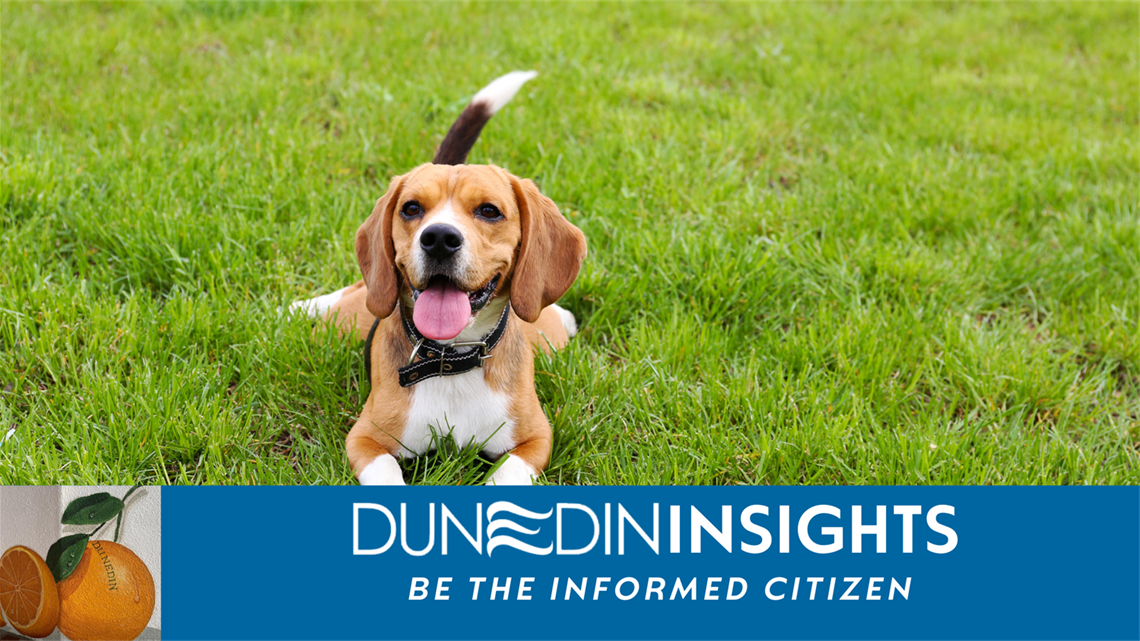Stormwater Stewardship Month: Scoop the Poop!
Published on May 20, 2025

By Hannah Malone
May is Stormwater Stewardship Month, and there is no better time to start being more mindful about how our everyday actions impact our waterways. Scooping the poop is one of the simplest and most effective ways you can help protect local water quality and support a healthier environment.
The Gross Truth About Poop
Dogs are great. Dunedin itself is one of the largest dog communities in the Tampa Bay area, even earning the nickname “Dog-edin”. We love our furry companions for their affectionate nature and funny antics, but dog ownership isn’t glamorous in its entirety. When your pet goes #2, there is something quite simple that you must do: scoop the poop!
According to the Tampa Bay Estuary Program, pets produce about 125 tons of waste daily. Leaving it uncollected negatively impacts community morale, public health, and the environment.
Pet feces may carry harmful bacteria, such as E. coli, Salmonella, and Giardia to name a few. The typical dog dropping contains approximately 3 billion fecal coliform bacteria, much higher than most other animals. Pathogens can linger in the environment for months and can infect people and animals who encounter the feces. Not cleaning up after your pet increases the risk of humans, other pets, and wildlife getting sick. Pet waste can also host parasites like roundworms, hookworms, and whip worm which can be passed to other dogs via exposure through consumption.
It’s important to note that the bacteria and parasites associated with pet waste are not stationary. They can spread into the soil and into waterways when pet waste is left unchecked. It is important to pick up after your pet to prevent poop from entering our stormwater system through urban runoff. That is why it is also important to regularly scoop your yards, as pet waste and the negative effects associated with it can travel after a rain!
A Preventable Source of Runoff Pollution
When left on the ground, dog waste doesn’t just disappear, and it doesn’t serve as a natural fertilizer either. Domestic dogs eat processed food, which makes their waste richer in nitrogen and phosphorus -- nutrients that are harmful in high concentrations. Additionally, decomposition of pet waste is slow, especially in urban environments, making it more of a pollutant than a fertilizer. Dog poop is not good for the grass, it kills it.
When rainfall washes pet waste into storm drains, it flows directly into local streams, lakes, or oceans. This untreated addition of contaminants and nutrients contributes to water pollution, which can cause harmful algal blooms and oxygen depletion in aquatic ecosystems. This alga is not only unsightly, but it kills off fish and other aquatic life. Pet waste one of the most preventable sources of urban runoff pollution, so make sure you do your part and scoop the poop!
How Can You Dispose of Pet Waste?
Bag it and Trash it! One of the most effective methods involves picking up your pet’s waste when you’re on a walk or after scooping your yard with a bag. Some people use plastic doggie bags while others opt for reusing plastic grocery bags. We personally recommend using biodegradable or compostable bags whenever possible. Never leave the bagged waste on the ground or throw it into a storm drain. Instead, after picking up the waste, tie the bag in a knot to seal it and throw it in an outdoor trash can – preferably one designated for pet waste.
If you find the job of picking up dog waste too unappealing, there are specialty services where you can hire a company to come scoop your yard and dispose of the waste.
Celebrate Stormwater Stewardship Month by Scooping the poop
Stormwater Stewardship Month serves as a reminder that our everyday choices affect the health of our waterways. Pick up after your pet and encourage others to do the same. It helps protect local water quality, supports a healthier environment, and keeps our public spaces clean.
Sources:
https://tbep.org/category/educational-products/water-quality/#:~:text=Pooches%20for%20the%20Planet%20Every%20day%20in,harmful%20bacteria%20and%20nutrients%20to%20wash%20into